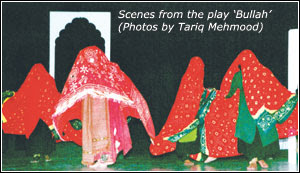
Published in 'Eyecandy' [The Post]
24th June, 2007
By Fariha Rashed
The invite, a black and white Polaroid picture splattered across with Coven band members, was enough eye candy to make any young girl rush over to see the gig! The well designed pass, gripped tightly in my hand read, 'Coven Live at the Levis Flagship Store….8th June…9pm onwards'.
The invite, a black and white Polaroid picture splattered across with Coven band members, was enough eye candy to make any young girl rush over to see the gig! The well designed pass, gripped tightly in my hand read, 'Coven Live at the Levis Flagship Store….8th June…9pm onwards'.
Surprisingly the gig started almost on time. Credit must be given to the official organizers Radio 1 FM 91and JB & Jaws Productions, for ensuring that a good ensemble of people were invited to see Coven live in action. The gig took place in the spacious basement of the Levis' store on the busy MM Alam Road. As I walked down the winding staircase, I was given free cans of Red Bull, the company also being one of the official sponsors of the gig. By the time I got there, signing and handing out of the band's album had already been concluded. After mingling with the likes of Omar Chaudhry [Levis Brand Manager], musician Shehzad Hameed, RJ Fizza Aslam, and fashion designer Rabya Butt, people were making their way to an area enclosed in glass. This space is usually crowded with trendy accessories and Levis' exclusive vintage collection of jeans. However, for the gig, the entire area was cleared out and Coven had set up their instruments at the far end of the square room. The Jammin Java Cafe was the first place that fans turned to when they needed anything to drink. The ambience was created by a myriad of lighting effects. One of the oldest vintage jeans, boxed in a glass encasing hung behind Sikandar Mufti as he started the gig with drumming of the drums. The crowd huddled together was left anticipating a great evening of music that would tempt insurmountable amounts of foot stomping and head banging. They got just that!
Each one of the Coven boys took their places on the floor, clad in Levi attire. Sikandar instantly blew everyone away with his wild thumping at the drum set. The band began with an instrumental and slowly built up the pace. Sailing Fast was the first and by far the best performance of the night. Sikandar Mufti's energized drum beats, Sameer Ahmed's tight bass playing, Omran Shafique's electrifying lead and Hamza Jafri's soulful rhythm, amalgamated to build the instrumental up into a rock-inspired musical fury! The band launched into subsequent compositions, one after the other, driving the crowd to the point of insanity as young boys and girls hooted and sang along. Hamza Jafri's impeccable vocals were crisp and powerful, yet singing for an hour and a half takes a lot of stamina and by the end of the show he began to tire, which affected his ability to sing with the same intensity. The constant sweating due to lack of ventilation at the venue may have contributed to this happening.
Omran was clearly versatile on lead. His body movements uniquely blended with his playing style, as he shifted his weight from side to side while strumming with great fervour. He lit a cigarette after every few songs and it truly seemed like the entire band was jamming in its back yard, completely relaxed and at ease. There was a loud, yet intimate communication between the audience and the band. They crowd exuded an aura of encouragement while the band responded by offering a hard hitting performance.
Sameer Ahmed is known as one of the best bassists in Pakistan, and he proved just why, yet again, at the gig. His bass playing was solid and added masterfully, to the already brilliant Coven sound. Sikandar, it seems, only gets better every time he performs. His wrist movements are agile and his beat was confident. Best of all, anyone watching him could tell that he was completely immersed in what he was doing. His facial expressions aren't to be missed!
The gig was a roaring success. Coven was loud, passionate and most of all won the hearts of all present at the event. For a band not very fond of commercial collaborations, the boys made a smart move entering into a contract with a label that specifically linked itself with rock music all around the world. Being the brand ambassadors for Levis will take them far. Music lives in Coven's core and no amount of commercialism can take that way from them, it can only help to add to it and give them access to bigger venues and more gigs. We hope to see a whole lot more of the band in the near future.


